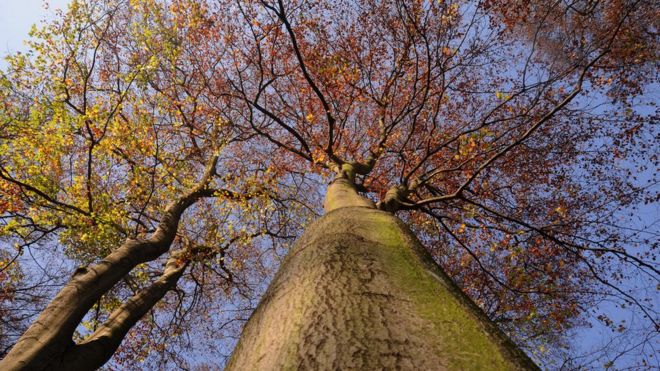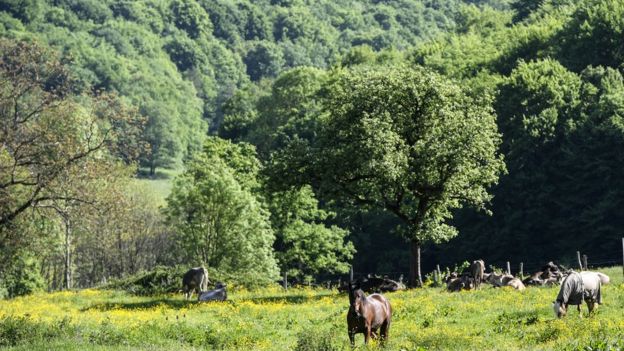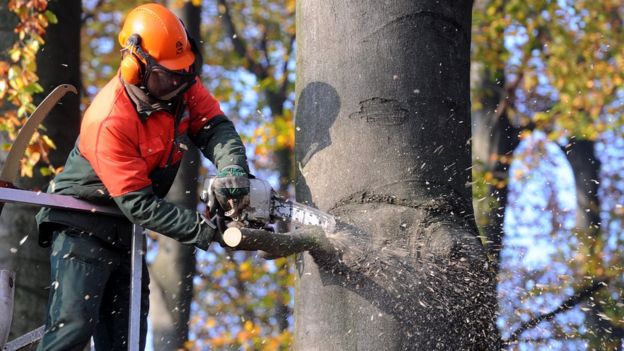 GETTY IMAGES
GETTY IMAGES
Leading researchers have condemned attempts to change the way carbon from trees will be counted in Europe.
The scientists fear that millions of tonnes of CO2 from forests will disappear from the books if the changes go ahead.
Trees are important carbon sinks as they soak up about 10% of Europe's emissions every year.
But some countries want to cut more trees down in future without counting the resulting loss of carbon.
Europe's forests have been increasing for the last century, and over the last 10 years the equivalent of 1,500 football pitches of trees have been added every day.
However accounting for carbon contained in trees is a fiendishly difficult task. Forests can both soak up and emit carbon depending on how old they are, and how they are managed and harvested.
As the European Union tries to put in place wide-ranging plans to restrict future carbon emissions, officials want to ensure that accounting for the impact of forests on the atmosphere should be based on sound science.
To this end they want to cap the use of forestry at the levels seen between 1990 and 2009. If countries want to harvest more trees in future than they did during this period, the loss of carbon would count towards the country's overall emissions.
However several countries including Austria, Finland, Poland and Sweden want a change in these rules so that increased harvesting in the future should not be penalised.
 GETTY IMAGES
GETTY IMAGES
The Finnish government says that it plans to increase tree harvesting by almost a quarter before 2030. The Finns argue that they should not have to account for these extra emissions, since the country's forests will still absorb more carbon dioxide than they release.
Industry supporters argue in favour of a more "flexible" approach. They say that Europe's forests have increased because of investment from businesses that want to be able to exploit the resource. Putting in place rules that leave trees standing forever won't benefit anyone, they say.
"In the Czech Republic they have a problem with their forests as they are getting older and older," said Sylvain Lhôte, from the Confederation of European Paper Industries (CEPI).
"Those forests were planted right after World War II; they are reaching an age of carbon potential. We need to exploit them or they will decay.
"Will they do this investment in future if they know they can't do this harvesting in the future?"
 GETTY IMAGES
GETTY IMAGES
But researchers in the field are very anxious about the proposed changes. Around 40 forestry experts from across the world have signed a letter arguing that if the rules are amended, it would "hide" roughly 300 million tonnes of carbon dioxide every year - equivalent to two-thirds of France's annual emissions.
"What the countries are arguing is that they should be able to use the forests in what they call a sustainable way," said Prof Joanna House from the University of Bristol, UK, and a former lead author for the Intergovernmental Panel on Climate Change.
"But it doesn't account for what's happening right now. If you are increasing the harvest rate, you will have less of a stock of carbon in the trees and soils."
The forestry industry argues that a smart accounting system is needed as different parts of Europe have different patterns of growth. A more flexible system would encourage countries like the UK, Germany and France to plant more trees, they believe. They want scientists to take a longer-term view.
"It's a long-term game. You need to be thinking how the carbon sink will behave over the period between today and 2050 and beyond. What are the implications in the long run?" said Sylvain Lhôte.
"It is a part of the thinking that is a little bit short-sighted."
However, the scientists involved reject that view - they believe they are speaking up for the atmosphere and the planet.
"These forest sinks are quite critical to meeting the two-degrees celsius target under the Paris Agreement," said Prof House.
"We can't meet those targets at all without the forest sinks. If a decision is made that sends the wrong type of incentives to protect those sinks - that could undermine the Paris Agreement."
Environment ministers from across the EU will discuss the issue on Monday in Brussels but no agreement on this complex area is expected at this point.
No comments:
Post a Comment